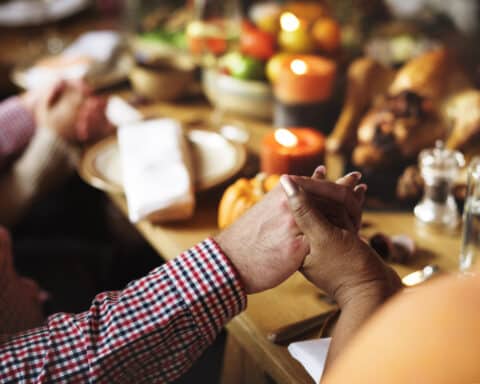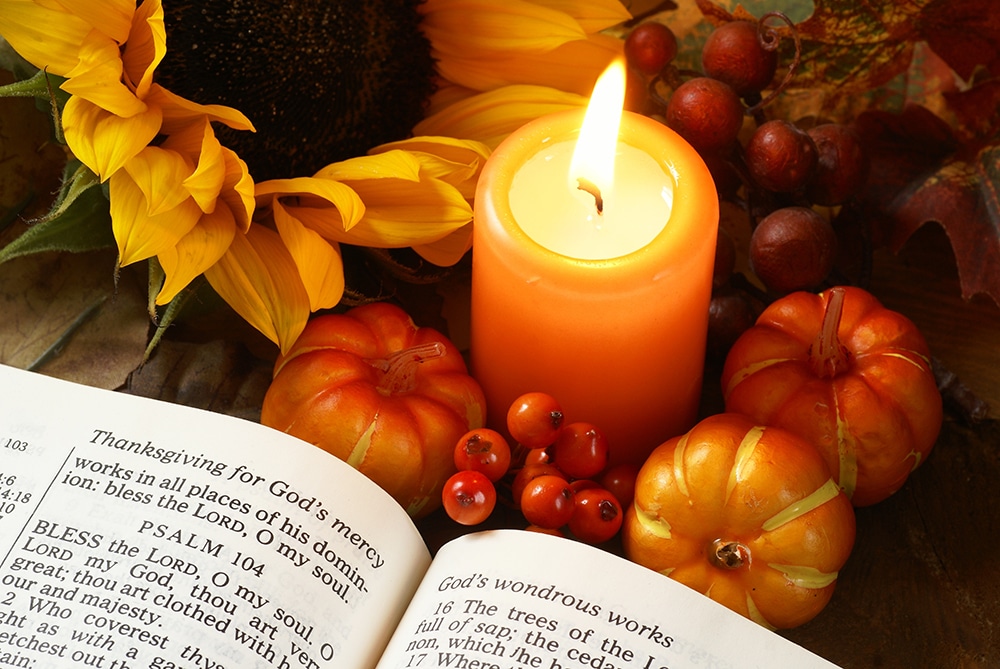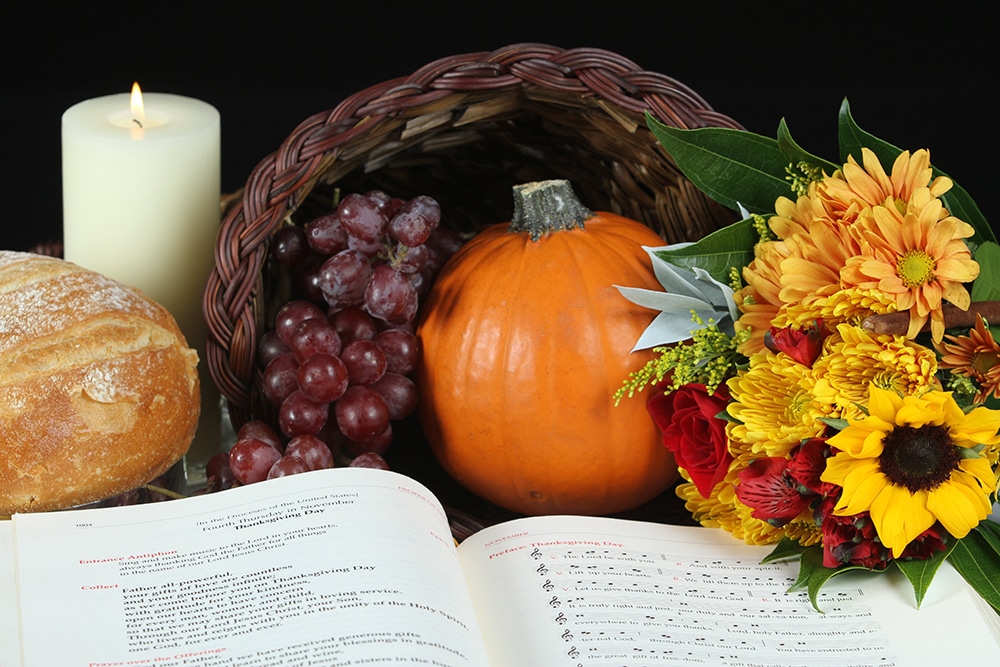It is that time of year when we push aside the pumpkins carved with the words “We Give Thanks” and instead spread out all the holiday sale ads so we can make our Christmas wish lists. In a blink of an eye, we go from being grateful to wanting more.

Wall Street and our world’s retailers work very hard to make sure we do not have too much gratitude. It can be bad for the economy. It is better for business if they can keep us in a constant state of wanting more. They have blinded us with so much glitz and glamour that we have given up a life of contentment to gain a world of junk and stress. Thus, we have failed to teach the beautiful virtue of contentment to our children and grandchildren.
The ancient philosopher Socrates stated the problem. He said, “He who is not contented with what he has would not be contented with what he would like to have.” Sadly, contentment is out of style, because we have been trained to think everything else in our lives is out of style — our homes, our clothes, our cars. If we are not constantly updating, we are not content. We are burning up our earth’s resources at an alarming rate — not because the things we have are broken or worn out, but simply because we are no longer happy with them.
As we prepare to celebrate Thanksgiving, we would do well to remember that contentment lies at the heart of being truly grateful for what we have. It is not easy to be content in a world that is always tempting us with something better. But it is surely worth our effort to try. For Jesus warned us, “What profit is there for one to gain the whole world and forfeit his life?” (Mk 8:36). Not only our lives, but also our souls are lost when we constantly feed on discontent. We must find ways to be more content. Here are a few suggestions.
Decide what matters
In his recent book “Let Us Dream,” Pope Francis writes that he hopes the world will be better after the COVID-19 pandemic. He calls this a time for us to “rethink our priorities — what we value, what we want, what we seek.” One good way to follow the Holy Father’s recommendations is to regularly spend some time with questions such as:
-
-
- What do I really need?
- Am I too busy?
- Have I lost my joy?
- What good am I missing because I am focused on unimportant stuff?
-
Regularly reviewing and prayerfully answering these questions can be a critical part of our spiritual journey. They can help us realize what our deepest wants and truest values should be. They are the secret to our spiritual peace and contentment.
Sunday ads, internet pop-ups and bragging neighbors might trick us into thinking we should value the new and different. Yet, these things are not good for our soul. Our Lord warns us to “Take care to guard against all greed, for though one may be rich, one’s life does not consist of possessions” (Lk 12:15).
While still a seminarian, Pope St. John XXIII tried to train himself to ask about everything, “What has this to do with eternity?” He was not the first saint to realize that neither contentment nor sanctity can be bought. St. Teresa of Ávila wrote, “It is when I possess the least that I have the fewest worries.”
Sadly, today, so much in our lives is useless. Food that has no nutritional value. Items in our homes that serve no real purpose. Time wasted in foolish ways. Purchases that are only made to impress someone else. We don’t need this kind of junk in our lives. What we need is to love and be loved. We need time for a hug, a smile or a little laughter. We need to hold hands with one another. These are the ingredients to a contented life. When we are too busy for these simple things, we are quite simply just too busy. Rearranging our priorities can change everything for us. Contentment is found in our souls, not in our stuff.
We don’t need this kind of junk in our lives. What we need is to love and be loved. We need time for a hug, a smile, or a little laughter. We need to hold hands with one another. These are the ingredients to a contented life.
Want less
One secret to contentment is found in Psalm 23. “The Lord is my shepherd; there is nothing I lack” (v. 1). Once we realize God has given us all we need, we can relax and be content. We can enjoy God’s gifts rather than always striving for more. This is contentment. Extremely skilled promoters try to steal this contentment from us by tempting us to think we always need something more. However, more will never bring us the peace and happiness we seek.
St. Paul tells us: “We brought nothing into the world, just as we shall not be able to take anything out of it. If we have food and clothing, we shall be content with that. Those who want to be rich are falling into temptation and into a trap and into many foolish and harmful desires, which plunge them into ruin and destruction” (1 Tm 6:7-9).

Contentment does not come from getting more; it comes from being happy with what we already have. It is the confidence of knowing what we have is enough. In her short life, St. Thérèse of Lisieux quickly realized this. She wrote, “Joy does not reside in the things about us, but in the very depths of our souls.” Once we see this, we can stop using shopping as a form of entertainment. We can learn, instead, to admire rather than to possess by spending more time in nature or museums rather than in stores.
We can further limit our thirst for more by valuing what we have. Limiting the amount of stuff we want frees us from the stress of organizing and storing all these new things. A simple commitment to give away one thing for each new item we acquire can help us keep balance and contentment in our lives. If we like everything that we already have so much that we do not want to part with any of it, that tells us how blessed we are. We do not need more. We can be content.
Help others
Jesus gave us a clue to contentment when he said, “whatever you did for one of these least brothers of mine, you did for me” (Mt 25:40). This is the secret to both eternal and earthly joy. Jesus never said that what we do for ourselves, we do for him. Our first duty as a Christian is to serve others. Thus, contentment comes from being good to others rather than just taking care of ourselves. Deep within our souls, we know that we are all God’s children. Although we may try to turn a blind eye to the suffering around us, our souls still sense the wrong. Our hearts whisper to us that we must help. The ancient wisdom of Christianity has always told us, “Do not let your hand be open to receive, but clenched when it is time to give” (Sir 4:31).

Those who say they have lived a blessed life often look back on what they were able to do for others more than on what they accumulated for themselves. For example, buying gifts for those in need can be much more rewarding than buying gifts for those who already have more than they need.
This understanding of the need to give has been innate in the human heart throughout many ancient and different cultures. In his masterpiece “The Gift,” Lewis Hyde tells of an old Welsh funeral custom where family members handed gifts to guests over the body of their deceased loved one. The idea was to give the impression that the gifts were from the deceased. The Welsh knew we would be judged by how much we gave, not how much we had.
If we really want contentment in this life, however, we cannot wait until after we are deceased to help others. Look around. The most content people we know are probably those who serve others. They find joy in following Our Lord’s command, “whoever wishes to be great among you shall be your servant” (Mt 20:26).
Those who say they have lived a blessed life often look back on what they were able to do for others more than on what they accumulated for themselves.
Give up anger
A content person knows how to let go of anger and graciously accept the differences that exist between ourselves and others. We cannot change what others do — even if those things hurt or annoy us. The people who make us mad often do not even care about our anger. Yet, we allow our own peace to be drained from our lives by this irritation.
No life is perfect. All of us can find some reasons to be bitter or angry. Yet, it is better to forget what is painful and concentrate on the good. One way to give up anger is to give up judging. As soon as we judge something as wrong, a bit of our serenity slips away. We get riled up and indignant. We will be more content if we stop thinking everything in this world is either black or white, good or bad. Even Pope Francis has famously declared, “Who am I to judge?”
Remember that Adam and Eve lost paradise when they ate from the forbidden tree of knowledge. God expelled them, saying: “See! The man has become like one of us, knowing good and evil!” (Gn 3:22). We, too, lose a little of our own paradise when we go around declaring things to be wrong and evil. It is simply not our job to become angry or self-righteous over what others do. That is God’s exclusive right.
Yet, sometimes we can let anger gnaw at us for years, holding grudges and living with bitterness. We need to embrace God’s command: “Remember not the events of the past, the things of long ago consider not” (Is 43:18). Giving up our anger will open our hearts to more contentment.

Embrace humility
St. Philip Neri once wrote, “Excessive sadness seldom springs from any other source than pride.” He felt that our ego’s high expectations generally made us “the carpenters of our own crosses.” It is hard to be content when we are always setting the bar too high for ourselves.
We see this played out in the home of Martha and Mary in Bethany. Mary sat humbly at Our Lord’s feet while Martha was buzzing around trying to prepare a meal. Mary was content. Martha was not. Martha was trying to impress. She had set the bar high. Mary was happy to just be humble. Yet Mary was the one who won our Lord’s praise.
It is our pride that demands we add more stress to our lives. It is humility that tells us to slow down. Many people admitted to a kind of surprising contentment during COVID-19 lockdowns. The isolation freed us from worrying about so many of the things we do to impress others — the clothes we wear, the places we go to eat or the vacations we take. We were forced to live a quieter life, and we discovered it was good in many ways.
When the disciples asked Jesus what they could do to be great in the kingdom of heaven, Our Lord replied, “Whoever humbles himself like this child is the greatest in the kingdom of heaven” (Mt 18:4). In many ways, COVID-19 humbled us. We found that many of the things we did to impress others actually gave us little joy. The humbleness of our lives was enough for us. We were happy and content just to gather our loved ones around us for a simple meal and be grateful that we were all safe and well.
It is our pride that demands we add more stress to our lives. It is humility that tells us to slow down.
Live in the moment
Nothing can rob us of contentment like anxiety. In his book “The Introduction to the Devout Life,” St. Francis deSales writes: “With the exception of sin, anxiety is the greatest evil that can happen to a soul. … There is nothing that tends to prevent enjoyment of good than to be disturbed and anxious.” Yet, we are anxious. We allow ourselves to be constantly wrapped in the stress of worrying about what we need to do next. The joy of the present moment slips quickly through our hands while our minds are living hours, days, weeks or even years in the future.
Our Lord told us, “Do not worry about tomorrow; tomorrow will take care of itself” (Mt 6:34). What is right in front of us now is what will give us the greatest joy. The more we can appreciate the good in each moment, the more we will be living the great virtue of contentment.
The present moment is such a tiny space. Just a breath. But, too often, we let it slip away. Certainly, we cannot always live in the present moment. Life requires some regular planning. However, we should try to relax a little more and trust God’s promise, “For I know well the plans I have in mind for you … plans for your welfare and not for woe, so as to give you a future of hope” (Jer 29:11). By believing God will take care of our future we might just discover that all is good right now.
Certainly, we cannot always live in the present moment. Life requires some regular planning. However, we should try to relax a little more and trust God’s promise, “For I know well the plans I have in mind for you.”
Practice silence
Noise disrupts contentment. The background noise of television, radio, traffic or other people can be annoying and irritating. Our souls greatly prefer silence. Thus, even the noise we have chosen for ourselves can be an unrecognized source of stress. Contentment grows in a quiet place.
Our souls need silence because it is so much easier for us to find God in silence. And God is the key to our deepest contentment. Even though the Israelites did not have as much noise to deal with in their ancient world, God told them, “Be still and know that I am God” (Ps 46:11). How much more do we, in this crazy, noisy world, need to follow this command?
| Practice the Works of Mercy |
|---|
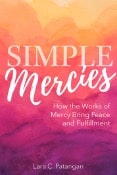 Even after achieving our most lofty goals, we are sometimes left confused by the emptiness we feel. We check the boxes. We fill our calendars. We get the promotion. We buy the bigger house. Yet there is still an unquenchable longing deep within us. Even after achieving our most lofty goals, we are sometimes left confused by the emptiness we feel. We check the boxes. We fill our calendars. We get the promotion. We buy the bigger house. Yet there is still an unquenchable longing deep within us.
“Simple Mercies: How the Works of Mercy Bring Peace and Fulfillment” (OSV, $16.95) offers an alternative. You can be the person God created you to be by loving and serving others through the works of mercy. By doing so, we are assured the peace and fulfillment that doesn’t come from the world, but from love of God and neighbor. Order at osvcatholicbookstore.com. |
Jesus reiterated the need for silence when the disciples returned to him after they had been away teaching in the neighboring towns. Jesus did not ask them to quickly tell him all that happened. Instead, he said, “Come away by yourselves to a deserted place and rest a while” (Mk 6:31). We, too, must give ourselves time to rest and be still. There is so much that is ugly in our world today. Ugly noise. Ugly news. Ugly politics. No wonder we have trouble being content. We need to establish a daily practice of setting aside a time and a place to be still and at peace.
The gift of silence, however, is not only about sitting quietly in some beautiful place. That is the easy part of silence. The hard part of silence is knowing how to keep our mouths shut in the presence of others. It is knowing how to avoid saying things that will hurt others and later cause us guilt and discontent. It is knowing how to resist the urge to criticize, blame or gossip. These kinds of hurtful noise may feel satisfying for a moment, but they leave us with the uncomfortable discontent of knowing we were not the best we could have been.
The gift of silence, however, is not only about sitting quietly in some beautiful place. That is the easy part of silence. The hard part of silence is knowing how to keep our mouths shut in the presence of others.
Walk with God
St. Augustine, after years of living a wild and unfulfilled life, confided his secret to contentment in his “Confessions.” “Our heart is restless until it rests in You, O God.” He declares that, “lush living likes to be taken for contended abundance,” but he concludes that only God is “the full and inexhaustible store of sweetness that never grows stale.” So very many other saints found walking with God to be the best kind of contentment. It is, quite honestly, what made them saints. In “Dark Night of the Soul,” St. John of the Cross wrote that those seeking contentment could find it by “contenting themselves with merely a peaceful and loving attentiveness toward God.”
Just like the great saints of old, we, too, will find that nothing can bring us full contentment until we walk with God. Walking with God helps us to see all things through his eyes, and we know that “God looked at everything he had made, and found it very good” (Gn 1:31).
When we walk with God, we find true contentment in simple yet beautiful ways. The quiet of a starry night. The silence of a mountain top. The peaceful walk along a wooded trail. The mysterious Presence in an empty church. The warm glow of a candle. It is in these ways that we can most easily connect with God.
Being united with God is the true purpose of our lives. Our soul was sent to this earth to find its way back to God. Our every decision should be determined by this simple test: Does this draw me closer to God or further from the Most Holy One? When we are close to God, we can rest our head against his heart when storms rock our boat. We are content.
Perhaps, St. Ignatius of Loyola gave us the best recipe for contentment in his beautiful Suscipe prayer: “Give me nothing more than your love and grace. These alone, O Lord, are enough for me.”
Susan M. Erschen writes from Missouri.
| A prayer for contentment |
|---|
| Loving and generous Creator, Thank you for the endless blessings you pour into my life. Help me realize that they are enough. Please free me from the stress of always wanting more. Inspire me to see what is most important in this life. Show me how to find moments each day to pause and know that life is good. Give me the grace to help others. Take from me all that angers and disturbs my mind. Guide me to the peace that comes from humility. Lead me to the simple and beautiful things that will soften and calm my heart. Show me how to be quiet enough to appreciate all that is so good in my life. Open my heart to the great and true contentment that comes from walking always with you. |

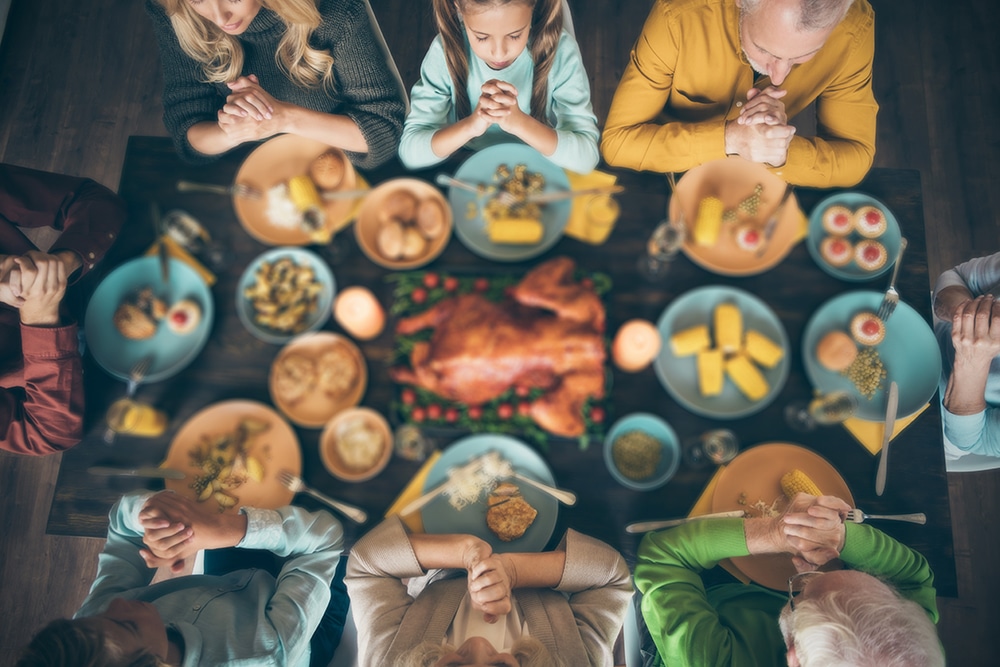
 We don’t need this kind of junk in our lives. What we need is to love and be loved. We need time for a hug, a smile, or a little laughter. We need to hold hands with one another. These are the ingredients to a contented life.
We don’t need this kind of junk in our lives. What we need is to love and be loved. We need time for a hug, a smile, or a little laughter. We need to hold hands with one another. These are the ingredients to a contented life.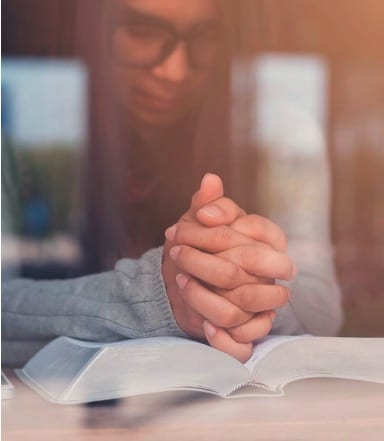 Certainly, we cannot always live in the present moment. Life requires some regular planning. However, we should try to relax a little more and trust God’s promise, “For I know well the plans I have in mind for you.”
Certainly, we cannot always live in the present moment. Life requires some regular planning. However, we should try to relax a little more and trust God’s promise, “For I know well the plans I have in mind for you.”